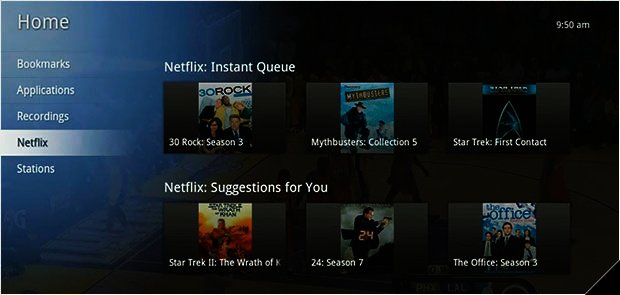

Internet + TV = Smart TV
So what exactly is “Smart TV”? Simply put it is a merger between two of the most important technological advances the past couple of centuries – good old TV and the internet.
The strongest Smart TV offering we’ve seen so far comes from global search giant Google, partnered with Intel, Sony and Logitech with their Google TV. The Google TV setup allows viewers to watch either traditional television broadcasts or enjoy a variety of shows streamed from the internet, access websites from their TV, and even run applications on it.
So what is powering Smart TV? Well hardware wise the leaders in the field at this stage is Intel with its Intel Atom CE4100 processor. This is Intel’s first system-on-a-chip aimed at Smart TV’s based on the Atom architecture. The chip allows Smart TV top boxes to be able to handle dual-stream 1080p video support and other processing duties.
But Google TV is facing its share of problems though, with Viacom (representing MTV, Comedy Central, Nickelodeon and VH1) recently opting out of an agreement with the service. They join News Corp, NBC Universal, Disney and CBS who’ve also shut out Google’s TV ambitions. Google is also encountering software issues and have last month asked manufacturers at this year’s Consumer Electronic Show (CES) in Las Vegas to delay their showing of Google TV devices.
At the end of the day they say content is king, and if Google can’t get the big guys interested Google TV will be off to a very shaky start. Oh yes, there is no news regarding a release date for Google TV in SA yet.


Your next phone will be a smartphone
In 2010 more and more manufacturers moved away from standard feature phones to the connected, application spewing smartphones of today. In fact, according to Mobile magazine, up to 80% of mobile phone users are expected to move to smartphones in the coming months, signifying the gradual extinction of the “call and sms” phones of yesteryear.
While the old feature phones may have been able to run some advanced Java applications, smartphones take this further by running a complete OS (Operating System), just like your PC runs Windows. At the same time developers are creating applications that can be downloaded onto smartphones to enhance usability.
Did you care what OS your last phone ran? Chance are you didn’t, but now mobile OS’s are becoming just as important a factor in the decision making process as the hardware. With the new Android 2.3, Symbian S^3 (Nokia), iOS 4.2 (iPhone), BlackBerry 6 OS and the Windows Phone 7 OS, the mobile OS realm is charged with competition for 2011.
Smartphones are also becoming cheaper as Huawei recently announced its IDEOSTM U8150 smartphone which will retail below R2000, while LG released the excellent Optimus One for just under R2500. Vodacom also announced the ZTE Vodafone 543, taking the spartan smartphone cake at only R499 a pop.